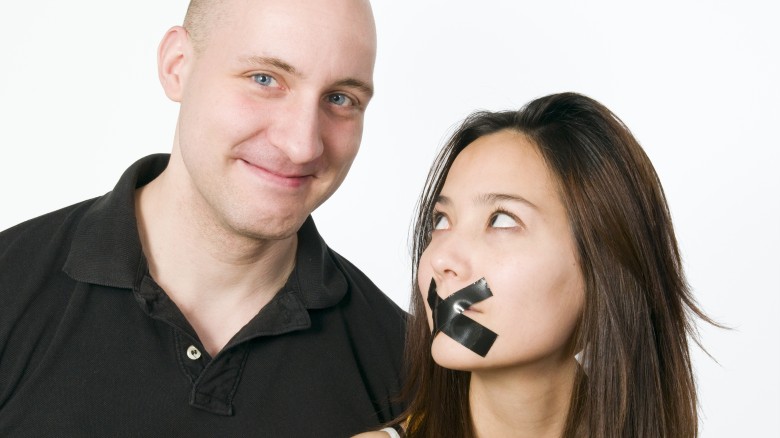10 Facts That Might Change The Way You Look At Men
Let's face it, ladies: we may never fully understand the male mind, and we certainly won't be able to walk a mile in their shoes. Still, with the current push for equality in today's social climate, attempting to look at life through their lenses can help men and women find common ground as societal gender roles continue to shift.
It's time you make the first move
Actually, it's been time. So why are so many women still playing hard to get, just to sit by the phone waiting for his call?
Psychology Today published an article noting a study on shifting the power of initiating relationships. The research suggested that "social expectations discouraged women from directly pursuing potential partners," and that those same societal expectations imposed a sense of "learned helplessness" in women.
Making that first move not only gives you personal control, specifically of your body, but it also gives your new love interest a chance to breathe easy without having to decode your body language. When it's finally the right time for you, go for it. Imagine if every chick quit playing hard to get. Eventually, all those unwanted advances would be a thing of the past!
And get this: according to a separate study of 32 heterosexual college men published in Psychology Today, 72.2 percent of them found initiating sexual intercourse to be too demanding, and hope for their female partners to make the first move. Men are just as ready for you to take charge!
It's okay to tell your man he's pretty
Handsome, good-looking, mighty fine. Whatever word perfectly describes your attraction to your man, let him know it. Men are generally expected to be apathetic about their appearance, but research suggests there's a certain yearning for flattery.
This Psychology Today article mentions a study consisting of 26 heterosexual college men, finding that roughly 40 percent wished to feel "sexy" to their female partners, rather than the traditional concept of men who are "desiring without being desired."
The man-flu is actually a thing
I F***ing Love Science published an article proposing that the man-flu (or man-cold, depending on where you're from) is, in fact, a reality and that men really do suffer more severely from their colds. It all seems to be concluded from a pretty basic experiment conducted in 2015 — the first of its kind — depicting estrogen hormones being able to fight off the flu in women easier than men, even though the hormone can be found in both genders.
The science suggests men may actually deserve extra sympathy when it comes to the common cold. Here's hoping they don't abuse it!
Men don't really see women as "objects"
There's good news, and there's bad news.
Not only does the objectification of women impose an almost unattainable standard of beauty on women, but it also leads men to treat women with varying levels of respect based on what a woman looks like and how she dresses.
This is actually the real issue with objectification, according to a study published in the Journal of Personality and Social Psychology. Men don't view sexually enticing women as, say, a chair — it's much more complex than that. In fact, our brains have the ability to focus interchangeably on a person's body or mind. In the study, the more sexually stimulating a woman appeared to be, the more likely men were influenced to view her as "incompetent."
So, the good news is that guys aren't completely unaware that we are, in fact, human beings (one small step for womankind). The bad news, however, is highlighted in the study's conclusion and implications, suggesting that a woman may be reduced to a body depending on how sexually stimulating she appears to be.
It seems as though "objectification" may not even be the right word anymore. "Bodification," anyone?
Men also grapple with body image
This may not be news for some, but men also suffer when comparing themselves to the increasingly muscular models featured in advertisements. The need to gain muscle has led to 4 million Americans, consisting mostly of men, to use steroids, according to a study reported in TIME.
The misconception that steroid use is only used to cheat in sports prevents people from connecting it to issues with body image, even though the majority of users aren't athletes at all.
Studies suggest that women have become more accepting of their bodies than men
Times really are changing, huh? According to research published in an American Psychology Association press release, women's dissatisfaction with their bodies has declined over the past few decades. Dr. Bryan Karazsia conducted a meta-analysis of research over time of both women's perception of weight as well as men's perception of muscularity. He found that, while women did appear to be more dissatisfied at specific periods of time, men were more consistently dissatisfied with their physical appearance.
Men face "toxic masculinity"
Women have an expectation to engage in what society deems to be feminine activities — wearing girly clothes, shaving body hair, tending to the home — and are met with criticism when they attempt to break with these expectations. In the same fashion, men are pressured to meet societal expectations that define masculinity. The demand to "be a man," however, actually has the potential to cause mental harm.
According to an analysis published in the Journal of Counseling Psychology, there is a relationship between those who conform to masculine norms and those who experience issues with mental health. The analysis aimed to measure adherence to 11 different societal norms imposed on men: "winning, emotional control, risk-taking, violence, dominance, playboy, self-reliance, primacy of work, power over women, disdain for homosexuals, and pursuit of status."
Part of this analysis detailed how it found that "conformity to specific masculine norms, such as self-reliance, emotional control, violence, dominance, risk-taking, and power over women, were inversely associated with attitudes toward seeking professional psychological help in a predominantly White American male college sample." The dire need to "man up" can be so intense for some men that it leads to mental health issues requiring professional help.
Gender roles aren't good for men, either
Think about the barriers women face when entering a male-dominated profession. On-the-job harassment is frequent, and, according to the American Psychology Association (APA), a study published in the Journal of Applied Psychology suggests that women who succeed in such a career are more likely to be viewed negatively. While men don't necessarily have to worry about workplace harassment the same way women do, those who pursue professions dominated by women face judgment that inevitably discourages other men from such fields.
Unfortunately, gender stereotypes still seem to prevent men from engaging in certain activities that have been established to be exclusively for women, even as women continue to take over male-dominated roles. The Los Angeles Times, for example, reported that "stay-at-home fathers exist in only 1% of married couples with kids under age 15, according to U.S. Census Bureau data."
Jack Myers, author of The Future of Men: Masculinity in the Twenty-First Century, makes a point when he suggests that men haven't gotten the same type of support that women have as gender roles shift. For instance, the idea of men wearing heels and makeup is still so taboo, despite women taking more risks with masculine fashion.
Yes, men can totally be feminists
Ah, the f-word. It can bring out the best — and the worst — in people. Like all social issues, many people have strong opinions regarding the topic. Sometimes, people argue that the movement focuses on giving advantages to women that men won't receive. That's just not the case, as self-proclaimed feminist Noah Berlatsky of The Atlantic eloquently explains.
Feminism aims to give everyone the opportunity to pursue their own version of happiness, regardless of societal expectations. While the movement shines a spotlight on empowering women, Berlatsky notes that it's imperative to remember that men also experience discrimination and social pressure that relates back to toxic masculinity.
"Misogyny is a cage for everyone — as long as women aren't free, men won't be, either," Berlatsky explains. By denouncing societal definitions of what it means to be a man and standing up to anyone who tries imposing them on others, men will benefit from feminism, too.
In fact, a lot of men already believe in what feminism stands for
When most men hear the word "feminism," their initial reaction is to run for the nearest exit. It's not uncommon to find many women speaking out against the ideology as well. In a poll on new wave feminism in America conducted by The Washington Post, 1,122 women and 488 men were surveyed on whether or not they support the movement, along with what type of words they would associate with it. When it came to openly supporting feminism, 50 percent of men surveyed did not claim to be a feminist, whereas over 50 percent of women did. Out of everyone surveyed, 43 percent associated the word "angry" with the movement.
And yet, a separate poll by Vox found that 85 percent of Americans surveyed in favor of equality for women. So, what's causing the disparity here? It seems that many people have an issue with the word itself, not the cause. The word "feminist" has become somewhat synonymous with "man-hater" to many, as some women have taken to Twitter to make exaggerated statements against men.
Perhaps men have trouble identifying with feminism because, on the surface, it seems to exclude them. When some women who represent the movement treat men poorly, the ultimate goal of feminism doesn't resonate with them because their only experience with it is a negative one. To wipe out misconceptions, feminists should always keep in mind that men also bear the brunt of misogyny. And usually, they don't even realize it.
Remember: misogyny is also harmful to men
While these facts may fall short of being a complete road map to the male psyche, hopefully one or two enlightened you to a handy take on perspective. Misogyny is about as harmful to men as it is women, affecting both genders emotionally and even physically. Keeping this in mind can give you insight to future problems between you and your man down the road.










